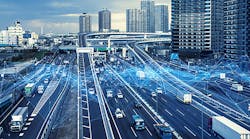Retail Industry Offers Infrastructure Advice to Biden Administration
As Congress holds hearings on a national infrastructure bill, the National Retail Federation offers its position. “The retail industry relies on our nation’s transportation infrastructure to move billions of dollars’ worth of merchandise every day to warehouses, distribution centers and stores and ultimately to consumers’ front doors,” said David French, senior vice president of Government Relations, in a statement issued on March 25. “A healthy and efficient infrastructure system supports economic development and growth in our local communities. Businesses of all sizes depend on this essential framework to deliver goods safely and fastidiously to their customers. We ask Congress to focus its consideration on policies that improve and elevate our transportation infrastructure. Our national infrastructure priorities have fallen victim to politics time and again. This Congress has an opportunity to set aside goals that have nothing to do with transportation policy and set our economy on a road to growth.”
The group offered its recommendations in a letter on Mach 16 to the chairmen of the Committee on Transportation Committee on Transportation and Infrastructure and Infrastructure U.S. House of Representative:
Find a long-term, sustainable source of revenue for the federal Highway Trust Fund
While much of the nation’s freight infrastructure is privately financed, the nation’s highways are publicly financed through fuel taxes, which are a proxy for user-fees. Unfortunately, there has been no significant increase in the federal fuel taxes in decades. In addition, fuel-efficient automobiles have decreased revenues over time, and this trend is likely to accelerate. Congress must find a funding mechanism that preserves the concept that the users of the system — trucks, automobiles and buses — should pay for it. New funding mechanisms or concepts, such as freight fees or taxes on freight transportation services, would overly burden one segment of users and should be avoided.
Create an Office of Multimodal Freight Transportation
By definition, moving freight across the nation requires the use of many modes of transportation. The products that line the shelves at NRF-member stores came by truck, but they also may have come by rail, air and water modes. Unfortunately, the U.S. Department of Transportation is organized by transportation mode, making it difficult to coordinate responses on important multimodal freight projects and issues. An Office of Multimodal Freight Transportation should be created within the U.S. Department of Transportation to holistically address these issues.
Support common-sense truck regulations
Retailers support safe and efficient trucking, but we also believe many regulations affecting commercial motor vehicles (CMVs) are not based on sound research with respect to the correlation between regulations and safety. Certain regulations have exacerbated the nation’s truck driver shortage and congestion issues. NRF strongly supports the establishment of a commercial driver apprenticeship program, such as the ones proposed by the Developing Responsible Individuals for a Vibrant Economy (DRIVE-Safe) Act and the FMCSA’s Under 21 Commercial Driver Pilot Program. These programs would help replenish the truck driver pool and offer promising careers to young adults. In addition, modernizing the national twin trailer standard from 28 feet to 33 feet would improve truck safety, efficiency and sustainability. Modernizing trucking equipment would lead reduced congestion with no cost to the taxpayer, increased safety, maximized efficiency and increased environmental gains.
Foster operational and environmental efficiencies in goods movement
Federal policy should employ positive approaches to enhance freight system efficiency and throughput with the goals of improving safety and reducing energy consumption and related greenhouse gas emissions.
Improve efficiency and reduce congestion
Congress should support and expand innovative government approaches to improve efficiency and reduce congestion. In particular, we believe the Supply Chain Innovation Teams created by the Federal Maritime Commission (FMC) provide an example of proactive government engagement that supports industry solutions that will improve supply chain efficiency, transparency and fluidity, while reducing congestion that contributes to greenhouse gas emissions. Improving port efficiency will also improve working conditions for short-haul truckers, and reduce consumer costs.
Build out America’s broadband infrastructure
High-speed broadband Internet is essential to American life in the 21st century, and digital goods and services are intrinsically woven into the future of retail. Broadband is an important component of last mile infrastructure needs of both businesses and consumers. In addition to ensuring supply chain efficiency for retailers, adopting policies to expand broadband infrastructure would help rural, urban and other underserved customers connect with retailers, restaurants and other businesses online that supply essential goods and services. Our experience during the pandemic has been a powerful lesson in the need to better serve customers by meeting the growing demand for digital services that will continue post-pandemic as more Americans increasingly come to rely on broadband to purchase food, goods and services. No community should be left behind in this digital evolution and Congress should include broadband infrastructure expansion in its broader infrastructure priorities.



